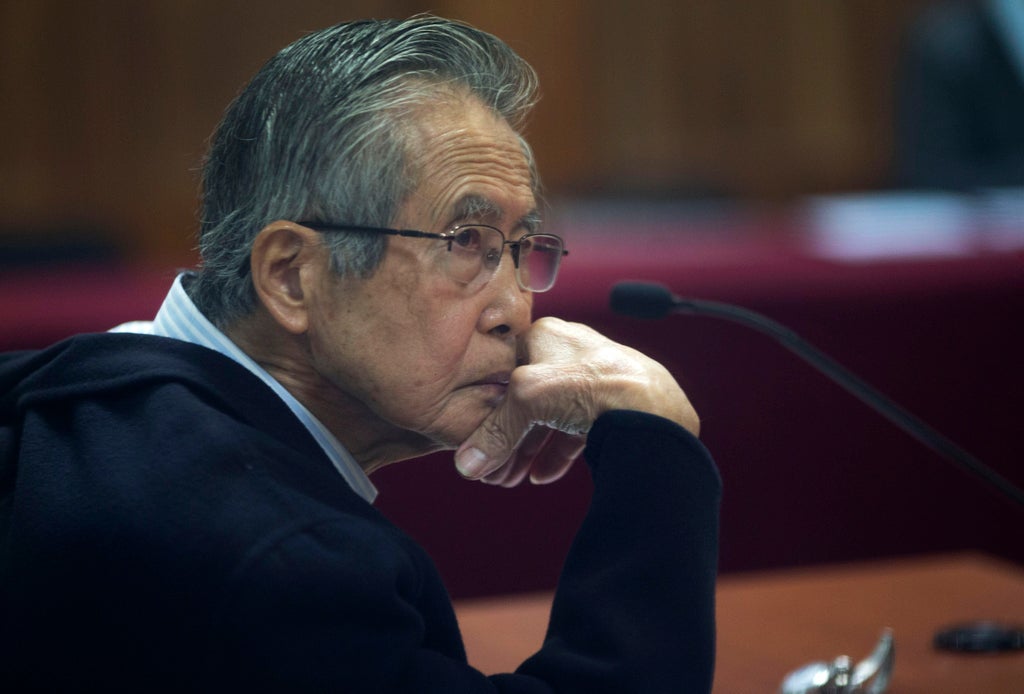
The Inter-American Court of Human Rights on Friday ordered Peru to “refrain” from releasing imprisoned former president Alberto Fujimori despite a ruling by the South American country's Constitutional Court that he be freed.
The regional human rights court said in a resolution published on its website that “the sentence issued by the Constitutional Court on March 17, 2022, which restores the effects of the pardon in favor of Alberto Fujimori, did not comply with the certain conditions."
Special prosecutor Carlos Reaño told The Associated Press that officials would keep the 83-year-old Fujimori in detention at the regional court’s request. Fujimori is being held in an exclusive prison where he is the only prisoner.
Supporters of Fujimori had gathered outside prison hoping to see his release, while those opposed to letting him out have protested in downtown Lima
In 2009 Fujimori was sentenced to 25 years in prison for being the intellectual author of 25 murders carried out by a clandestine military squad in two massacres that occurred during his term (1990-2000). The military killed with impunity and with the support of his management in the framework of the fight against the Shining Path terrorist group.
One of the massacres occurred in an area called Barrios Altos - where 15 neighbors were killed during a party, including a child - and the other in La Cantuta, a university that trains school teachers, in which nine students and a professor died.
In addition to the 25-year sentence, the former president is convicted in three other corruption cases for which he owes $13.6 million.
On Christmas Eve in 2017, then-president Pablo Kuczynski granted Fujimori a humanitarian pardon in exchange for support for his weak government from lawmakers close to the former president. But the country’s Supreme Court overturned it in 2018 and ordered the ex-strongman returned to prison to serve out his sentence for human rights abuses.
The Constitutional Court’s mid-March decision restored the humanitarian pardon, but fearing he could be released the regional human rights court on March 30 requested that Peru not release Fujimori until it could examine the case. It heard from victims' families and representatives of the Peruvian state, before issuing Friday's resolution, which cannot be appealed.
Fujimori, who governed from 1990 to 2000, remains a polarizing figure in the Andean country. Some Peruvians laud him for defeating the Maoist Shining Path guerrilla movement, while others loathe him for human rights violations carried out under his government.
A former mathematics professor, Fujimori was a political outsider when he emerged from obscurity to win Peru’s 1990 presidential election over writer Mario Vargas Llosa.
Peru was being ravaged by runaway inflation and guerrilla violence when he took office. He quickly rebuilt the economy with mass privatizations of state industries. Defeating the fanatical Shining Path rebels took longer but his fight won him broad-based support.
But his presidency collapsed just as dramatically as his rise to power.
After briefly shutting down Congress and putting himself into a third term, Fujimori fled the country in disgrace in 2000 after leaked videotapes showed his spy chief, Vladimiro Montesinos, bribing lawmakers. Fujimori went to Japan, his parents’ homeland, and sent in his resignation by fax.
Five years later, he stunned supporters and enemies alike when he flew to neighboring Chile, where he was arrested and extradited to Peru. Fujimori’s goal was to run for Peru’s presidency again in 2006, but instead, he was put on trial.
His daughter, Keiko Fujimori, was a presidential candidate last year and vowed to release him if she got elected. But Pedro Castillo defeated her in a runoff election.







